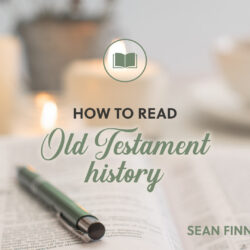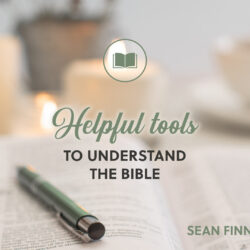This is part 6 of the Read the Bible For Yourself.
Tragically, many Christians skip over reading the Torah. They focus on the Gospels or Epistles of the New Testament. However, the first five books of the Bible contain many rich insights into God’s heart and how he asked Israel to live. In fact, it’s impossible to understand the rest of the Bible, or even Jesus, without first becoming familiar with the Law. This episode will provide you an overview of the Torah’s instruction about holiness, sacrifice, justice, and sacred time.
Listen to this episode on Spotify or Apple Podcasts
—— Links ——
- See other episodes in Read the Bible For Yourself
- Check out the class New Covenant Theology to learn more about biblical covenants as well as this podcast episode on the New Covenant and this one responding to typical arguments for Torah observance today
- Other classes are available here, including How We Got the Bible, which explores the manuscript transmission and translation of the Bible
- Get the transcript of this episode
- Support Restitutio by donating here
- Join our Restitutio Facebook Group and follow Sean Finnegan on Twitter @RestitutioSF
- Leave a voice message via SpeakPipe with questions or comments and we may play them out on the air
- Intro music: Good Vibes by MBB Attribution-ShareAlike 3.0 Unported (CC BY-SA 3.0) Free Download / Stream: Music promoted by Audio Library.
- Who is Sean Finnegan? Read his bio here
—— Notes ——
Reading the Law takes work
- Sometimes it’s just weird (Lev 11:20-23)
- Sometimes it’s tedious (Ex 26:7-9)
- Important to focus while reading
- Eliminate distractions
- Read aloud if you can
- Keep track of things (underline, highlight, write notes in the margin)
The books of the Law (Torah)
- Genesis
- Exodus
- Leviticus
- Numbers
- Deuteronomy
Four categories of Law
- Holiness
- Sacrifice
- Justice
- Sacred time
Sinai and the giving of the Law
- God came down on the mountain and spoke audibly (Ex 19:16-21)
- The people agreed to obey and then “stood at a distance” while Moses went up and received the rest of the Law (Ex 20:18-21)
Tabernacle
- The 2nd half of Exodus contains meticulous instructions on how to build the tabernacle and everything that went outside and inside of it.
- The tabernacle is where God dwelled and where the people made animal sacrifices.
- Inside the tabernacle was a lampstand, table, bread, alter of incense, and ark of the covenant. Outside of the tent stood the bronze basin and the bronze altar for sacrifices.
Numbers
- Organization of the camp
- Tabernacle was in the center, surrounded by Levites
- the Levites set up, tore down, and transported the tabernacle (Num 18:21-24).
- Later on, David commissioned the Levites to sing and play instruments to praise God (1 Chron 16)
- A man named Korah instigated a rebellion that resulted in disastrous judgement with God showing that he wanted only the Levites to serve him through the tabernacle worship system.
Leviticus
- Priests maintained the inside of the tabernacle.
- They butchered animals and offered them on the altar.
- They managed cleansing ritual when someone became unclean for touching a dead person, touching the carcass of an unclean animal, nocturnal emissions, monthly menstruation, childbirth, bodily discharges, and skin diseases.
- Israel => Levites => Priests => High Priest
Types of sacrifices (Lev 17:11)
- Burnt offerings
- Grain offerings
- Peace (well-being) offerings
- Sin offerings
- Guilt offerings
- Holy day offerings
Covenantal structure of Deuteronomy
- Preamble (Deut 1:1-5)
- Historical review (Deut 1:6-4:49)
- Individual laws/requirements (Deut 5-26)
- Deposit of the text (Deut 31:9, 24-26)
- List of witnesses (Deut 4:26; 30:19)
- Blessings and curses (Deut 27-28)
- Ratification ceremony (Deut 29)
- Exhortation (Deut 29-30)
Deuteronomy
- Second telling of the law to the next generation
- Shows so much of God’s heart
- Apodictic laws: general commands (ex. 10 Commandments)
- Casuistic laws: specific scenarios (ex. Deut 22:6-7; 23:15-16)
Dealing with embarrassing or sexist laws
- God gave the Law to move the people of Israel forward.
- Comparisons to other ancient near eastern (ANE) law codes (like the Code of Hammurabi) show how the Torah curbed abuses and protected the vulnerable.
- On first reading, a law (ex. Deut 21:10-14) may seem bizarre or barbaric, but when you consider the historical setting and the options available in a patriarchal society, the wisdom of the Torah shines through brilliantly.
- Two books that can help you make sense of confusing laws include Is God a Moral Monster? by Paul Copan and How (Not) to Read the Bible by Dan Kimball.
Why the Law matters to you
- The Torah teaches you who God is and what his preferences are.
- The new covenant includes many of the same prohibitions and commandments as the old covenant.
- The Law shows how highly God values holiness over syncretism.
- Understanding the Pentateuch is necessary for understanding the rest of the Bible.
- You can extract ethical principles from laws even when the particulars don’t line up.
Review:
- The Torah or Pentateuch includes Genesis, Exodus, Leviticus, Numbers, and Deuteronomy, though much of these books contains narrative.
- The Law was God’s gracious covenant with Israel, detailing how he wanted them to live and be different than the nations around them.
- The tabernacle was the worship facility God had his people construct. Under King Solomon, the temple in Jerusalem replaced the tabernacle.
- God set apart the tribe of Levites to manage the tabernacle and the offerings made there. They didn’t receive a land inheritance; instead, the people supported them financially.
- God set apart the priests, a subset of the Levites, to manage the sacrificial system, maintain holiness, and cleanse those who became unclean.
- The high priest was the only one allowed to enter the holy of holies in the tabernacle on the Day of Atonement (Yom Kippur).
- Deuteronomy contains the clearest expression of the covenant God made with Israel, updated for the second generation.
- Although some of the laws contained in the Torah seem backward or offensive to us, they limited abuse and protected vulnerable people amid a patriarchal and unequal society.
- Although most of the specifics of the Torah don’t apply to Christians today, it’s critical to understand to know God better and understand other parts of the Bible.







Andrew Shelton here from England. Loving the series, very helpful. Looking forward to the rest. Regarding the sabbath, then if God rested on the sixth day from creating then I think it will be beneficial for us to have a day off from work too. Also some feel guilty if they rest. God endorses work and rest. The scriptural wording is ‘remember the sabbath day’ which implies it was already a part of life as a rest from work.
Hey Sean!
Another great overview of this subject. However have to admit I found your answer back to the individual regarding food laws/Torah keeping very confusing. Not saying I have it all figured out–it just didn’t seem to make sense to say in one breath that “Christians don’t have to keep the food laws” and yet you point to Acts 15–wherein the Gentiles are actually given 2 food laws. I remember your response before on Acts 15 question saying it may be regarding table fellowship, but that’s not in the context of Acts 15. It’s possible you’re correct, but sexual immorality isn’t really something I think of regarding table fellowship between Jewish believers and Gentiles. I found an explanation of Acts 15 regarding Gentiles keeping the Torah more of a relevance to THEIR prevalent sins in that culture. To me, this is not different than if a former drug addict came to you and wanted to know Jesus… you wouldn’t throw the entire Torah at him and burden him with that much at once. You’d have him focus on staying clean and separate from drugs and coming to fellowship for support and good faith. This is what I see in Acts 15, seeing as how even the leadership said “Moses(meaning the Torah) was preached every Sabbath” at the end of the chapter implying they could learn more of what God wanted from them by joining weekly fellowship at Sabbath.
The idea of New Covenant from your perspective seems problematic from my point of view. I’ve always understood the “Love God and Love Neighbor” as what Paul(and think Jesus teaches)… that the ENTIRE Torah hangs on these two laws. If you love God, you won’t want to offend Him–such as not eating pork, or keeping Sabbath holy for example. If you love your neighbor, you won’t want to murder him or covet his wife for example. The other laws hang on the main two regarding loving your God and your neighbor. I understand wanting to point to Galatians to reference circumcision problems in the church, but we know Paul did circumcise Timothy. I’m more of the opinion that either James(and his people) were at odds with Paul(which I doubt)—or they were teaching that initial faith required circumcision to be saved. Timothy was already a part of the faith, and later got circumcised. Why wouldn’t Paul have just stood up and rejected this unless he was only coming against some sort of “circumcised to be saved” idea?
I know, it’s confusing without being there to just ask Paul “WHAT WERE YOU THINKING?!?” I really don’t think this is as clear cut as I was taught growing up or as an adult. And I don’t want to twist your entire great series on this into just Torah talk and debate. I’m not as informed on it, but I do know we built this country on much of the Torah and it’s principles. You’re still allowed to marry first cousins in about half of the US states, which is biblical(maybe like polygamy?). I’d recommend getting someone like Matthew Janzen(Torah keeping Christian) on for a great dialogue where you could probe him with these types of questions in another podcast. That would be a great discussion on God’s Law and what God wants from Christians today, Jew and Gentile.
Bookending this with a “Thank you.” I still highly appreciate this series and love your insights on things I might have missed. I hope you have more of this series to share as it’s bringing up a lot of good things for me to think about again.